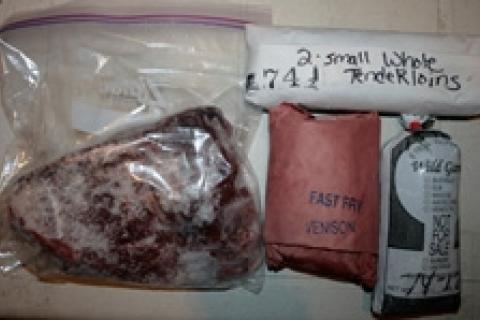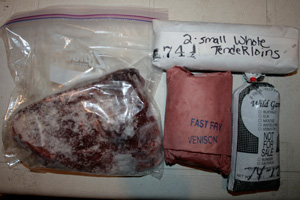
I've gutted my fair share of deer, moose and bears over the years, and I've also skinned a few along the way. But when it comes to butchering that tasty game meat, I want to make sure that I get all the best cuts possible. That's why I leave this to the professionals.
 |
| Using plastic freezer bags (left) can leave game meat with freezer burn, while professional butchers tightly wrap the meat and roll it in waxed butcher paper instead. |
Bass Pro Shops offers a huge selection of terrific knives and tools and other gadgets to make butchering and processing wild game easier, but the reality is that unless you just want to turn an entire deer into burger or sausage, you still need to know what you are doing. Unfortunately a couple of wrong cuts with a knife can, at best, rob you of the option of tasty butterfly steaks, shoulder roasts, etc. or, at worst, render choice cuts such as the tenderloins suitable for only chuck or stewing meat.
I live in Ontario, Canada, but I do a fair bit of hunting in the US. This past fall I was fortunate enough to take a nice whitetail buck on a hunt in the Midwest. The outfitter arranged for it to be butchered by a couple of local lads, at no extra cost to me. They asked me what types of cuts I wanted and actually did a very nice job with the butchering. However, making sure that steaks don't wind up as stew isn't the only reason I prefer professional's processing venison whenever possible. How the meat is packaged for long-term freezer storage is another.
Unfortunately they only had plastic freezer bags available to put the meat in, and unless all of the air is removed prior to freezing, it won't be long until the meat is crusted in ice crystals and freezer burn won't be far behind. Tightly packing and then rolling the meat in waxed butcher paper instead will allow meat to last up to two years in a freezer.
Besides properly packaging the meat in this way, a butcher will also neatly label each package, so you know exactly what cut you are removing from the freezer. They can also include the date and the game specie, so you don't get your deer mixed up with your elk, etc. Not only does this all ensure that your meat lasts longer and is more conveniently and efficiently stored, but it also just looks nicer. Meat that is neatly packaged and labeled makes for a nicer gift for a friend or a thank you for a landowner who gave you permission to hunt their property.
It can also help if you have to transport the meat across an international border, such as back into the US from Canada or Mexico. Due largely to concerns about Chronic Wasting Disease, most jurisdictions now have strict rules about bringing back animal parts from other locales. Making sure that all meat is deboned and butchered, properly wrapped, frozen and labeled, and sealed (taped shut) in a leak-proof cooler with your name and license number clearly and indelibly written on the outside can help make these border crossings quick and painless.
If all this isn't reason enough, professional butchering is also fairly inexpensive, especially when you consider all of the other costs of hunting big game. Most butchers only charge about $50-$75 for a deer, and that's a small price to pay for tasty meat that you and your friends and family can enjoy for a long time. Many butchers also offer the option of fancier cuts like pepperettes, breakfast sausage, spiced sausage, etc., which can really add some nice variety to your wild game meals.
Good hunting — and eating.
- 4368 views

